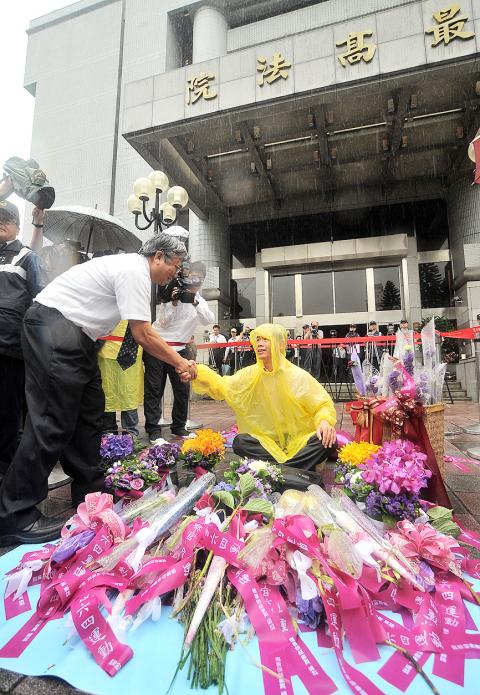|
Prosecutor begins one-man protest
By Rich Chang / Staff reporter

Prosecutor Wu Hsun-lung shakes
hands with other prosecutors yesterday as he stages a sit-in in front of the
Supreme Court in Taipei to protest against its decision on limiting courts’
obligation to investigate evidence. Wu says his vigil in a restricted area is
legal because it is neither an assembly nor a parade.
Photo: Liu Hsin-de, Taipei Times
A district prosecutor yesterday launched a
sit-in protest in front of the Supreme Court against a resolution stipulating
that prosecutors have to shoulder 100 percent of the burden of proof.
Penghu District Prosecutor Wu Hsun-Lung (吳巡龍), who has a doctorate in law from
Stanford Law School, launched his protest in front of the Supreme Court
yesterday morning.
Wu said the Supreme Court held a criminal court meeting in January and made a
resolution that in court actions, judges will only investigate evidence in favor
of defendants and prosecutors have to shoulder 100 percent of the burden of
proof in evidence against defendants.
“The Supreme Court’s resolution is not only largely in favor of defendants, it
also violates the Constitution and the Code of Criminal Procedure (刑事訴訟法). I’ve
never seen such a criminal procedure law anywhere else,” Wu said.
Wu said he had decided to hold a sit-in to express his view that the Supreme
Court’s resolution violated the Constitution.
To avoid violating the Assembly and Parade Act (集會遊行法), some prosecutors did not
join Wu’s sit-in, but one by one handed him flowers to show their support. Two
major prosecutors’ associations are also supporting his protest.
Prosecutors’ Association president Shih Ching-tang (施慶堂) tried to give a letter
of protest signed by 1,078 prosecutors, 27 law professors and 23 crime victims
to Supreme Court Chief Judge Yang Ting-chang (楊鼎章), but Yang refused to see Shih
or take the letter. Shih said the Supreme Court was arrogant and ignored
prosecutors.
Meanwhile, Prosecutors’ Reform Association president Eric Chen (陳瑞仁) said: “The
protest is just the beginning. Prosecutors will be holding hearings on this
issue.”
In a statement in the afternoon, the Supreme Court said it regretted the
prosecutors’ actions.
The court accused Wu and other prosecutors of teaching people how to avoid
violating the Assembly and Parade Act by holding a one-person protest.
The Supreme Court said that the resolution was passed to consolidate the
principle of presumption of innocence and that prosecutors, who shoulder the
burden of proof, have equal status with defendants and judges remain neutral in
courts.
|
![]()
![]()
![]()